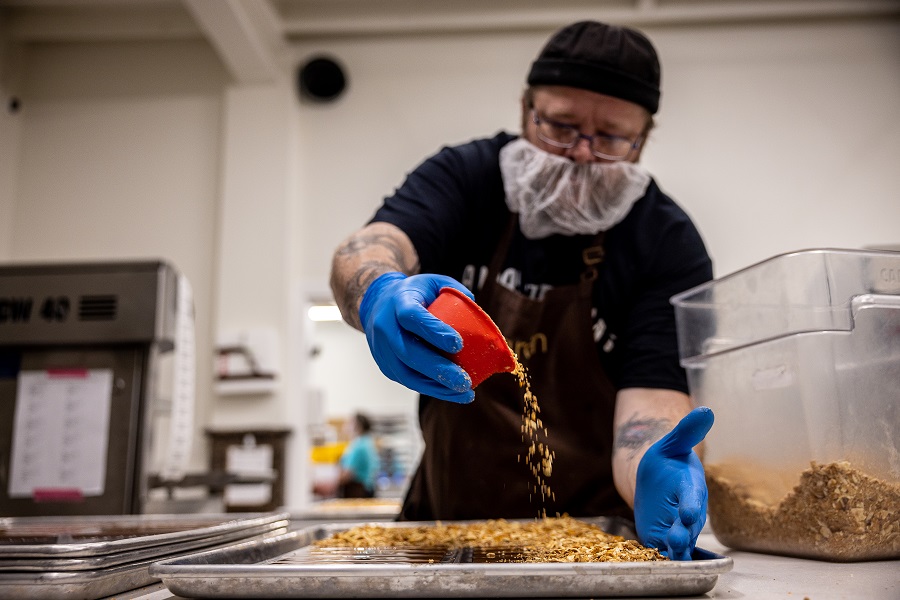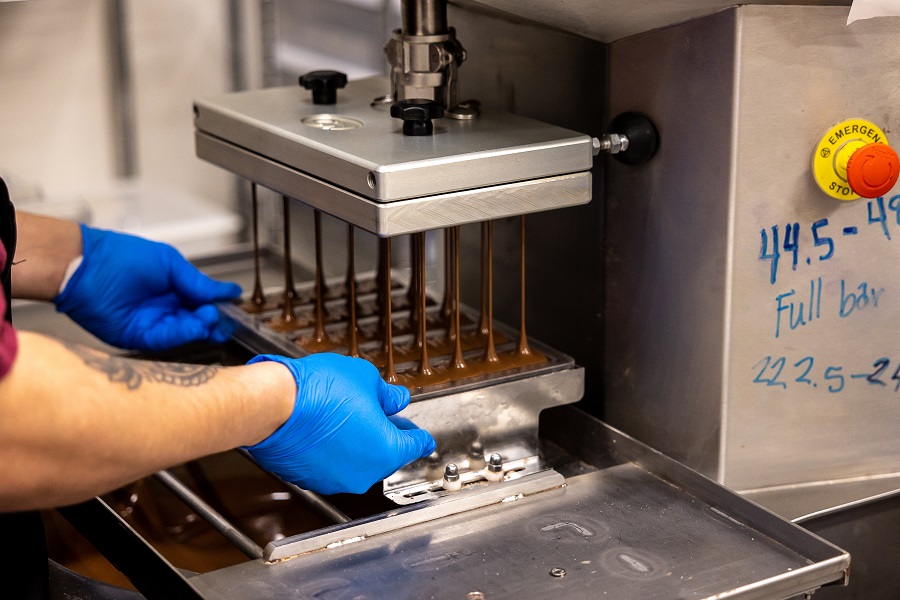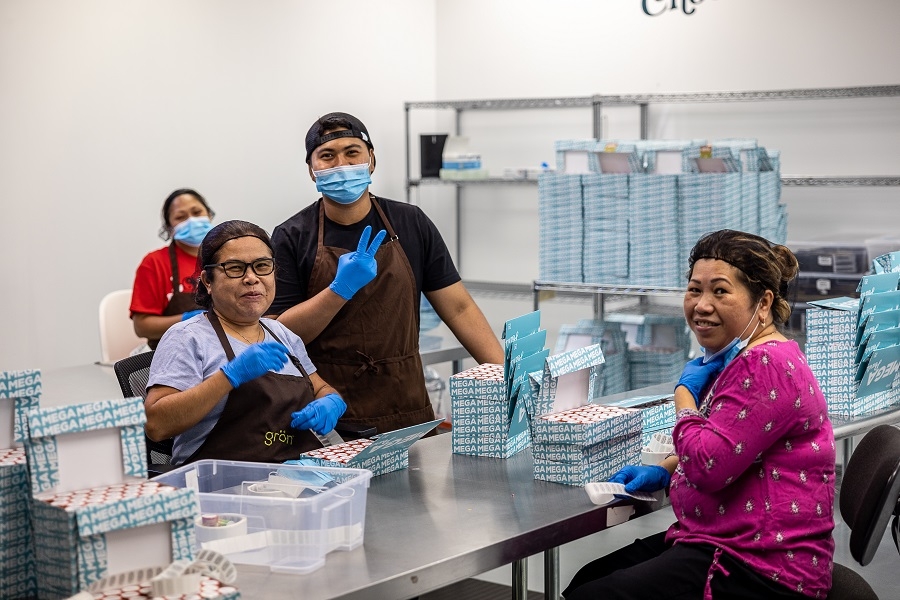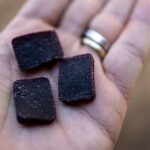Oregon-based Grön Edibles goes international — but is still hoping for an end to federal cannabis prohibition
Christine Smith is used to working through regulations.
Smith founded THC edibles brand Grön (which means ‘Green’ in Swedish) as a side project in 2015 while working at an architecture firm in Portland. But says she knew after one year of operation that her edibles company was where she wanted to dedicate her time.
“I realized I had stopped being creative and I started being a project manager. I was looking for a creative outlet on the side and I saw this burgeoning cannabis industry,” says Smith. “I saw that there weren’t any really high-quality chocolate products on the line, and so I thought I would make my own.”

Grön founder Christine Smith. Photo Jason Kaplan
Oregon’s cannabis industry has ebbed and flowed since the drug was made legal for recreational use in 2015, but Grön is growing: according to internal reports shared with Oregon Business, the company has grown 276% in overall revenue since 2019. This month the company officially went international, with Grön products now sold in Canada through a third-party distributor. Smith attributes the company’s growth to its ability to connect to middle-market consumers — and by expanding into less-regulated, less competitive national market.
Domestically, Grön products are sold in Oklahoma, Missouri, Nevada, and Arizona as well as Oregon. The company has three production facilities in Portland. Smith says her dream is to open a new Oregon facility if and when cannabis becomes federally legal. But until then, having a single mass-manufacturing plant for edibles doesn’t make sense, given current regulations barring cannabis from crossing state lines.
Until federal legalization, and all THC-infused products manufactured in Oregon must be sold here. Smaller manufacturing operations spread out across states may not be the most efficient way of running a national cannabis brand, but it’s the only way for now.

Grön founder Christine Smith holds chocolate covered edibles. Photo Jason Kaplan
Smith is also the company’s head chocolatier, a skill she taught herself while creating her business. The metal chocolate squirters and vats of candy shelling brought to mind Willy Wonka’s Chocolate Factory, but despite the humming machinery, most of the products were pressed and rolled by hand. Something Smith says is a central tenant of good chocolate making.
There is nothing illegal about exporting chocolate and packaging, and not being able to move cannabis across state lines is something Smith says her company has been able to work around. From her distribution hub in Portland, Smith can export the packaging, candy ingredients, chocolate, and recipes to facilities out of state to be made with cannabis grown in those areas.
Grön operations in Arizona, Oklahoma, and Missouri are all run by Grön employees, but the production space is subleased with a license partner able to obtain a state cannabis processing license.

A worker pours crushed peanut butter pretzels over chotolate at Grön’s original Portland kitchen.
The Nevada operation is like the Canada agreement, but with more hands-on involvement in marketing and sales support. Both are ‘licensing agreements’ which operate like franchises, with Grön giving contractual permission to make, promote, and sell Grön products in their own markets.
While the exact THC strains present in the candies may not be 100% identical from state to state, she says the things consumers care most about — flavor, branding and experience of her gummies — is something she has been able to keep consistent.
That is not to say becoming an international brand hasn’t caused problems. Supply chain issues and the world’s current wheat shortages — a byproduct of Russia’s invasion of Ukraine in February — have made getting enough inventory to satisfy demand a challenge. (Some of Grön’s candy bars use wheat to create sugary wafer crumbles, as do certain candy coatings.) Smith tells OB she has had to modify some recipes to leave out rarer ingredients like coconut to ensure consistency while her company pioneers into growing out-of-state markets.

Photo: Jason Kaplan
Grön edibles are still sold mostly in Oregon: about 40% of the companies’ revenue comes from the Oregon market. But that percentage is going down every year, and the decrease is likely to continue due to Oregon’s ban on supermarket sales of CBN products — which took effect July 1.
Smith says that decision “broke her heart.”
According to the OLCC, the compound, which produces drowsiness, is frequently created under laboratory conditions and thus considered “artificially derived.”
Smith says she’s thankful the OLCC is giving edible companies a year to continue selling through dispensaries and is hopeful the commission will revise its ban once more research on the compound has been conducted.
“The one-to-one-to-one THC, CBD, and CBN format is so effective. There’s a reason why it’s 30% of our revenue,” says Smith. “To lose that for consumers I think was setting back the industry. So being able to find at least an avenue for us to be able to keep it on market in Oregon, I think is important.”
After the OLCC’s announcement, both Smith and an attorney for Wyld CBD, Oregon’s other major edibles brand both slammed the ban as hobbling Oregon cannabis brands from growing in their home state.
Because of the ban, Grön officially discontinued its line of CBD-only products, since its top-selling item, CBN-infused gummies, contained CBN. Smith says she has no intention of leaving Oregon, though the ban did make her reconsider where Grön’s world headquarters should be located, especially given her company’s continuing expansion into other states. She says the customer base of cannabis users is also changing, with more consumers looking for low-dose produts to help with sleep and relaxation,
“Cannabis products are becoming more normalized day by day as more states vote to legalize,” says Smith. “If I was going to put my wizard hat on, I think we’re going see a lot more low-dose product. People who use THC to make doing housework and homework with their kids a little more pleasant. The minor cannabinoids products, for people are looking for sleep, to relax and to focus, are getting really, huge.”
Smith says she thinks the low-dose THC products, like her gummies, are going to become more mainstream as time goes on. She says the largest-growing demographic for cannabis users are people wanting to use the product medicinally. If the trend continues, it could be great news for Grön products.
Smith admits she believes the Oregon cannabis market is overregulated, but says companies able to compete up to Oregon’s cannabis standards are in better shape to across the country. Until federal legalization takes place, and likely after, states will have differing standards on what they consider acceptable THC products — standards which Grön will have likely met or exceeded in Oregon.
Despite Oregon’s comparatively heavy regulations, Smith says having a strong presence in Oregon will always be a top priority for her company. She describes Oregon cannabis consumers as having refined taste, and that staying ahead in the hypercompetitive Oregon market gives the Grön the best chance to succeed elsewhere.
“As a cannabis brand, if you can make it here, you can make it anywhere,” says Smith.
To subscribe to Oregon Business, click here.







